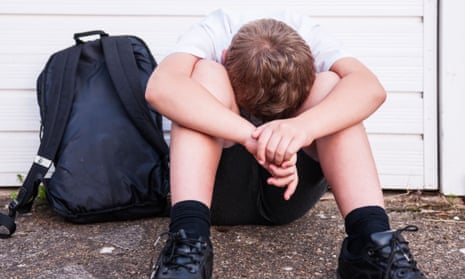Bullying and violent behaviour has dropped off within schools in England over the past decade, according to figures released by the Department for Education (DfE), although more than one in 10 young people now say they have experienced cyberbullying.
The behaviour statistics released to mark the start of anti-bullying week were hailed by education secretary Nicky Morgan as the result of stronger discipline in schools, although the figures showed little change in the proportion of children complaining of daily, weekly or monthly bullying.
According to the DfE’s study, there are 30,000 fewer children in England facing bullying than a decade previously, thanks to sharp falls in violent threats and physical attacks, while the proportion experiencing the most common forms of school-age bullying – name-calling and social exclusion – remained similar.
“As part of our commitment to delivering social justice we are helping teachers and charities end the scourge of bullying in our schools. We are determined to tackle any barriers which stop pupils attending school and learning so they can fulfil their potential,” Morgan said.
“Thanks to our reforms and their efforts, bullying is plummeting. While there is still more to do, today’s news confirms that strong discipline coupled with the right support allows children to flourish, and can transform lives by reducing bullying.”
The report’s authors said that the new figures represented “a significant estimated decrease” in bullying.
“We estimate that 30,000 fewer year 10 pupils experienced bullying in 2014 than would have been the case if the rates of bullying were the same as they were in 2005,” the report concluded.
The survey of more than 10,000 young people in England found that the proportion of pupils experiencing regular bullying – around 7% - was much the same as the previous 2005 survey. The largest decline was for those who experienced acts of bullying less often than once a month.
Overall, 36% said they had experienced some form of bullying in the previous 12 months, compared with 41% in the 2005 survey.
The figures also chart the rise of the new category of cyberbullying, via social media and mobile phones. While school-age children in 2005 were not asked about cyber-bullying, 11% of the latest cohort said they had experienced it, with the majority of cases taking place outside school.
Girls appear to be more at risk from cyberbullying, with 15% reporting that they had experienced it during the previous year, compared with just 7% of boys.
The DfE figures are the latest analysis from a longitudinal study that aims to record the views and experiences of more than 10,000 young people in England. When the group were surveyed last year they were aged 15 or 16.
The sample includes pupils who attend private schools as well as those at state secondary schools and special needs schools.
Girls were more likely to report being bullied, and were twice as likely to have suffered name-calling – the most common form of bullying – than boys. By contrast, 17% of boys said they had experienced threats of violence compared with 12% of girls. Boys were twice as likely to have experienced actual violence than girls.
A separate survey released by the Anti-Bullying Alliance and the National Children’s Bureau said that teachers and GPs complained of receiving little or no training in how to deal with the traumatic effects of bullying on children.
The nationwide survey of 16-25 year-olds found that half of those who were bullied reported mental health issues such as anxiety and depression, with some reporting more serious instances of self-harm and suicidal thoughts.
But a large majority of teachers in the same survey said that they were ill-equipped to deal with the effects of bullying, while 126 family doctors questioned by the Royal College of General Practitioners said they had no training or resources to support young people with problems resulting from bullying.
More than 90% of the GPs said they had seen adults with symptoms that were related to childhood bullying.
“We recognise the impact bullying can have on mental health and we are investing £1.4bn over the next five years for young people’s mental health services,” a DfE spokesman said.

Comments (…)
Sign in or create your Guardian account to join the discussion